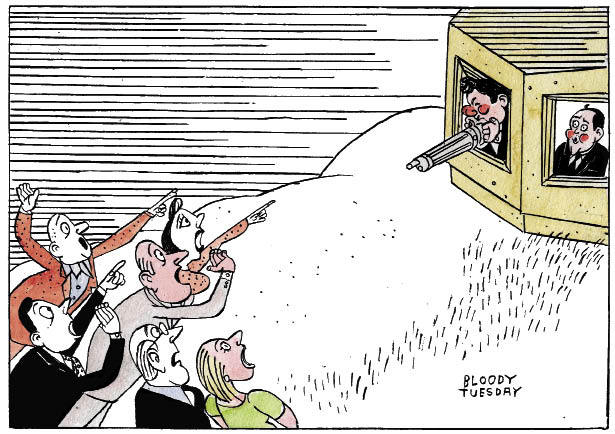In the Budget, Mr George Osborne, the Chancellor of the Exchequer, said that the balance of cuts to tax rises would be 77 per cent to 23 per cent. Whitehall departments would have to cut spending by 25 per cent. Borrowing would fall from £149 billion this year to £20 billion in 2015-16. Debt would be 67 per cent of GDP by 2015-16, compared with the 75 per cent planned by Labour in its budget in March. Current expenditure of £637 billion this year would rise to £711 billion in 2015-16, to meet debt interest. Mr Osborne raised VAT from 17.5 per cent to 20 per cent, from 4 January 2011. For basic-rate income tax payers, the personal allowance will rise by £1,000 in April, to £7,475. Capital gains tax for higher-rate taxpayers rose to 28 per cent immediately. Councils would be offered funds to allow them to freeze council tax for a year. Child benefit is to be frozen for three years and tax credits reduced for families earning more than £40,000. Single parents will be expected to work when their youngest child begins school. Housing benefit will be limited to £400 a week. Public-sector workers earning more than £21,000 will have a two-year pay freeze. Growth of 1.2 per cent is predicted for this year, rising to 2.9 per cent for 2013. Unemployment is expected to reach 8.1 per cent this year, then to fall to 6.1 per cent by 2015. White Papers are to be published on the economies of British regions and of Northern Ireland. Labour’s plan to tax cider by an extra 10 per cent is scrapped.
The number of British service personnel killed in the war in Afghanistan since 2001 passed 300. Mr John Hutton, the former Labour Work and Pensions Secretary, began a review of public-sector pensions on behalf of the government. Mr Andrew Lansley, the Health Secretary, abolished targets for patients to be given an appointment with a general practitioner within 48 hours and treatment at an accident and emergency surgery within four hours. Lord Young of Graffham began an overhaul of health and safety laws; ‘I don’t think offices are dangerous places,’ he said. Jon Venables, 27, one of the two killers of two-year-old James Bulger in 1993, was charged with possession of indecent images of children; he had been recalled to prison in February after being released and given a new identity in 2001. Lord Quinton, the philosopher and wit, died, aged 85. The Royal Navy prepared to allow women to serve on submarines for the first time. The Meteorological Office has paid £25,000 since 2007 for damage done by weather balloons falling from the sky; one smashed a conservatory window and another cracked a car windscreen.
In Niger, 400,000 children were among the half of the country’s people left without enough food after a drought and crop failure. Mrs Roza Otunbayeva, the interim leader of Kyrgyzstan, said that as many as 2,000 people might have died in fighting earlier this month. Perhaps 400,000 had fled their homes, with 100,000 crossing into Uzbekistan. Floods in Brazil left at least 1,000 dead and 100,000 homeless. Floods in southern China damaged 68,000 houses. Israel announced an easing of its blockade of Gaza, with all civilian goods to be let into the territory unless they were listed as banned goods. Police in Jamaica arrested Christopher ‘Dudus’ Coke, wanted in the United States on drugs charges; the search for him in Kingston last month led to gunfights leaving 70 dead. The French World Cup football team went on strike, after which they lost to South Africa, and both fell out of the competition.
General Stanley McChrystal, the US commander in Afghanistan, was summoned to Washington after he and his aides were quoted in Rolling Stone magazine criticising President Barack Obama. Mr Rahm Emanuel, the White House chief of staff, said that the decision by Mr Tony Hayward, the chief executive of BP, to spend a day yachting round the Isle of Wight was one of a ‘long line of PR gaffes and mistakes’. The BP oil well that exploded on 20 April continued to leak thousands of barrels of oil into the Gulf of Mexico. Mr Hayward planned to meet President Dmitry Medvedev of Russia, to convince him that the company was not on the brink of collapse. Russia said it would cut off gas to Belarus because it hadn’t paid its bill. The Polish presidential election went to a second round after voting left Mr Bronislaw Komorowski ahead of Mr Jaroslaw Kaczynski, the twin brother of the President killed in the air crash at Smolensk in April. China set about allowing a slight appreciation of the renminbi, while declaring that the currency would remain ‘basically stable’. Iran doubled the denomination of its highest-value banknote to 100,000 rials, worth about $10. CSH






Comments